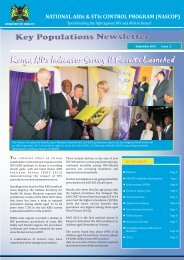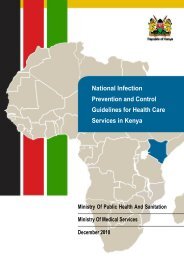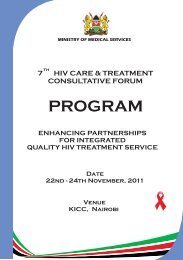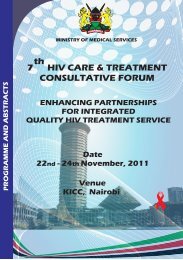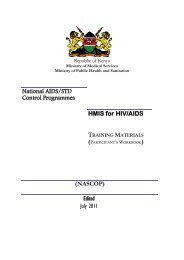D:\My Documents\HBC\HCBC Implem - Kenya National AIDS & STI ...
D:\My Documents\HBC\HCBC Implem - Kenya National AIDS & STI ...
D:\My Documents\HBC\HCBC Implem - Kenya National AIDS & STI ...
You also want an ePaper? Increase the reach of your titles
YUMPU automatically turns print PDFs into web optimized ePapers that Google loves.
A healthy community iseverybody’s businessCommunity health worker trainingrequires 11 days of classroomsessions combined with a period ofsupervised practical training spreadover two to three months and withperformance reports. Only aftercompletion of both theory andpractical sessions will certification beapproved. The training must becarried out by individuals andinstitutions approved/accredited bythe relevant DHMT. Deferent levels oftraining will be in line with the capacitybuilding objectives described inSection 3.1.4.Additional training content may beidentified to meet the needs ofspecific target audiences, for examplematerials for treatment literacy,adherence to anti-retroviral therapy(ART), stigma reduction, or domestichygiene and sanitation. The <strong>Kenya</strong>Medical Training College (KMTC), ifadequately prepared, has theinstitutional potential to facilitate theroll-out of HCBC training countrywidein liaison with NASCOP and DHMTs.4.2.2 Identifying/AppointingQualified Trainers/FacilitatorsA high standard of training cannot bemaintained without qualified trainers.Since the key care elements in HCBChave a clinical orientation and involvenursing care, a trainer with a clinicalbackground and relevant trainingskills from an accredited traininginstitution is required.HCBC <strong>Implem</strong>entation Strategies4.2.3 Harmonizing Training Venuesand Monitoring of TrainingsTraining venues will be establishedand approved by the relevant DHMT.Different venues are suitable fordifferent groups of trainees.Assessing learning needs anddetermining the training content forthe various levels will ensure thatsessions are relevant andappropriate. On-site training has beenfound to be most effective in HCBCactivities and notable in cutting costs,hence facilitating larger numbers tobe covered through training.4.2.4 Formalizing Certification ofTraineesA systematic serialization of all HCBCcertificates awarded to successfullytrained health professionals andcommunity health workers ismandatory. This will ensure thatcertification is limited to individualsand cadres who are properly trainedusing the approved curriculum andtraining materials. DHMTs in alldistricts in the country, in collaborationwith NASCOP, are currentlyimplementing this requirement toensure identification of authenticqualifications.4.3 Financing and EnsuringSustainabilitySustainable financial support forHCBC is very challenging forcommunities. Theseprogrammes are often vulnerable toinconsistent and sporadic sources offunding. The following strategies can15



